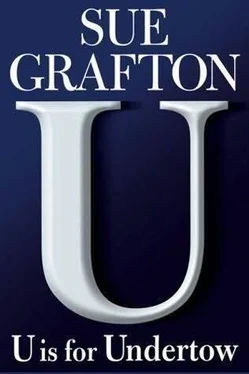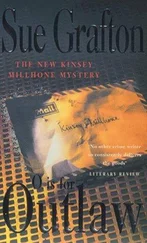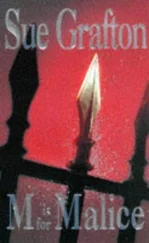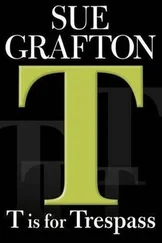“You’re a lucky man.”
“That I am.”
Getting in my car again, I wondered how lucky he’d feel when he heard about the trouble his son Walker was in. If he’d been informed, he gave no indication of it.
On my way back to the office I made a second trip to Mid-City Cat Clinic, this time turning into the alleyway behind the place. The name of each business was stenciled on the back door so it was easy to spot the shed Dr. McNally’d mentioned. I parked and got out, inspecting it at close range. It was smaller than the housing used for garbage cans, mounted on the wall to the right of the door. The wood construction was straightforward, with a simple metal hook that fit into a small metal eye. There was no other locking mechanism visible and no evidence there’d ever been one. There wasn’t even a hasp where a padlock or combination lock could have been inserted and secured. I pulled the wooden knob and the door opened with scarcely a sound. Except for dried leaves and spiderwebs, the interior was empty and didn’t appear to be in use. At the back of the shed, the door that had opened into the clinic in Dr. McNally’s day had been boarded over.
I studied the alley in both directions. Across the way I could see a series of private garages, with gated walkways leading into backyards, most of which were separated by fencing. This was a public thoroughfare, utilitarian in nature but accessible from either end. Anybody could have known about the pickups-pet hospital staff and clientele, animal control officers, neighbors, adjacent businesses, trash collectors, vagrants. Cleverly, I’d narrowed the field of corpse-napping suspects to a couple of hundred unknown individuals. The question still remained: why would someone steal a dead dog and transport it to Horton Ravine for burial?
Unless, as Sutton had suggested, the two men felt compelled to substitute Ulf’s remains for whatever, or whomever, they were in the process of burying when the six-year-old Sutton stumbled onto the scene. I’d dismissed the notion when he’d mentioned it, but now I reconsidered. An adult male wolfdog would have been far bigger than a four-year-old child, but since I didn’t have a way to determine what had actually happened, maybe it was time to approach the question from another point of view: not the motive for the dog’s removal and subsequent burial, but the choice of the spot. Why there and not somewhere else?
After lunch I drove to Horton Ravine, taking Via Juliana as far as the Y where Alita Lane branched off. I parked in front of Felix Holderman’s house, locked the car, and ambled up his driveway. To my right, at the far end of the house, the overhead doors were open on his three-car garage. A late-model sedan sat in the first bay and the other two had been converted into a workshop. Felix had his back to me but he sensed my presence. He looked up and lifted a hand to signal that he’d be with me momentarily, and then returned to the task in front of him. He wore dark blue denim overalls, a long-sleeve shirt, gloves, and goggles. In an open cabinet to one side, sheets of colored glass were stored vertically.
As I approached I could see that he was creating a stained-glass panel. On the workbench he’d laid out a design, a stylized pattern of trees, leaves, and branches against a white background. He’d cut paper templates for each section of the design, and these he’d glued to various pieces of glass. As I watched he ran a wheel glass cutter along the edge of one template. He’d already cut a number of sections, and I waited while he completed the straight line he was tracing. When he finished he tapped the glass and it broke neatly.
He lifted his goggles and pushed them up on his head.
I said, “Hi, Mr. Holderman. Sorry to interrupt your work.”
He peeled off his gloves and laid them on the work surface with a shake of his head. “Don’t worry about it. I was ready for a break. I get lost in this stuff and it’s good to come up for air now and then. You were the one who knocked on my door and asked to walk the hill. You should have told me what you were up to.”
“Sorry for the omission, but I didn’t think I’d succeed. I should have laid it out for you regardless.”
“I’ve blanked on your name.”
“Kinsey Millhone,” I said. “Did the officers bring you up to speed?”
“After the fact. They seemed to think you were onto something.”
“I did, too, but I’ve been wrong before and such is life.” I peered at the section of stained glass he was working on. “You made the panels in your front door?”
“I did. This one’s a bit more complex, but I’m having a good time.”
“That’s the lead?”
He nodded. “It’s called came. These are U-shaped cross sections for the circumference and H-shaped for the middle of the design. Lead came is meant for two-dimensional panes. You want to do three dimensions, you use a copper foil technique.”
“What will you do with the window when it’s done?”
“Give it away. Just about everybody in my family’s had a window foisted off on ’em at some point. My daughter’s house looks like a church.” He smiled, showing dimples I hadn’t seen before. “What brings you back to the neighborhood?”
“I’m curious about the people who owned the property where the dog was buried. You mentioned the house changed hands twice. Did you know the previous owners?”
“Oh, sure. Patrick and Deborah Unruh. Nice folks. The dog wasn’t theirs, if that’s what you’re wondering.”
“I know. I’ve talked to the real owner and he has no idea how the dog ended up in someone else’s backyard. There’s probably a simple explanation.”
“That whole section of the hill was overgrown back then. Maybe whoever buried the dog didn’t realize it was private property.”
“Could be,” I said. “When did the Unruhs sell the house?”
“You got me there. It’s been at least fifteen years. I’d say closer to twenty.”
“Did they buy another house in the area?”
“No. They moved to a gated community in Los Angeles. He owned a manufacturing plant, making uniforms, sports gear, and outerwear. He worked down there through the week and drove up here weekends.”
“You think he wanted a place closer to his business?”
“That’d be my guess. The move was abrupt, which I thought was odd. They were here one day, gone the next. I remember chatting with them at a barbecue a few days before and neither said a word about plans to relocate. Next thing I know there’s a moving van in the drive and guys are loading up the household goods.”
“Do you remember when this was?”
“Not a clue. One of the other neighbors might know. The gal next door, Avis Jent, kept in touch for a while. She could tell you more.”
“What about you? No exchange of Christmas cards?”
“We weren’t close friends, more like social acquaintances. Patrick was killed in a plane crash a couple of years ago. After that, I heard Deborah moved back here, but I’ve never had it confirmed. A town this size, you’d think you’d run into people all the time, but you don’t.”
“Do you think she remarried? I ask because I’m wondering if she’s still using the name Unruh.”
“Probably. From what I saw of them, they were one of those magic twosomes who mate for life. They even looked alike. Both tall and trim, fair-haired.”
“Any children?”
“Just one, a boy named Greg. She and Patrick ended up raising his daughter, Rain, so that might count as two kids.”
“What’s the story on him?”
“Typical of the times. Early sixties, he went off to college as a clean-cut kid and came home looking like a bum. I believe it was the summer after his sophomore year, he and this little gal showed up in a yellow school bus. He’d been traveling across the country, thinking what a free spirit he was while he borrowed money from his folks. Turned out his girlfriend was pregnant and the two of them were broke. Deborah and Patrick offered them a place to stay. Nothing permanent, just until the baby came. The girl already had one kid, five or six years old. Greg parked the bus on one side of the cabana and that’s where they hung out. I used to see the little boy running around the front yard without a stitch of clothes on. Deborah and Patrick were fit to be tied. To top it off, once the baby was born, Greg and what’s-her-face took off with the boy and left the little girl behind. After two years of no contact and no financial support, the court terminated their parental rights and the Unruhs adopted her.”
Читать дальше












